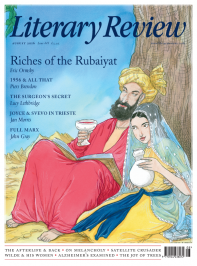Martin Vander Weyer
Networking Opportunities
Eccentric Orbits: The Iridium Story
By John Bloom
Grove Press 537pp £16.99
As a long-time reviewer of investigative business books, I have been known to complain that British authors are too hostile to business itself and that American authors are too obsessed with detail. Good business stories are first and foremost about human strengths and frailties, even when they are also about technology and finance. They need to be built around heroes and villains rather than numbers and gizmos, even when the numbers are billions and the gizmos are big boys’ toys like rockets, satellites and mobile phones that work at the South Pole.
All of which leads me to the opinion that John Bloom’s Eccentric Orbits: The Iridium Story is a prize-worthy example of the investigative genre. First, it evinces an admiration for purposeful, risk-taking, tech-driven capitalism, while also recognising what bad corporate behaviour looks like. Secondly, even though it conforms to my American stereotype in its depth of detail, this story has a hero – Dan Colussy, of whom more in a moment – and a monster called Motorola. It has conflict and triumph on a Wagnerian scale. And it has a fluent style, with occasional jokes, that leads us nimbly through the densest thickets as Bloom recounts the history of a project called Iridium, which established a phone system based on a constellation of satellites set in the eccentric orbits of the title, perpetually converging and diverging in elegant patterns across the surface of the globe.
This awesomely ambitious concept – in which signals bounce from satellite to satellite without (in theory) ever dropping a call, providing the ultimate communication network for soldiers in combat, aid workers in disaster zones and ships at sea, not to mention global business chiefs – was developed by scientists at

Sign Up to our newsletter
Receive free articles, highlights from the archive, news, details of prizes, and much more.@Lit_Review
Follow Literary Review on Twitter
Twitter Feed
Like many trains in this country, HS2 has been blighted by delays and rocketing costs.
David Leeder asks who is to blame for the project's failures.
David Leeder - One-Track Minds
David Leeder: One-Track Minds - Off the Rails: The Inside Story of HS2 by Sally Gimson
literaryreview.co.uk
In this month's @Lit_Review, I reviewed Nicola Barker's latest, TonyInterruptor, a weird/brilliant/singular novel in which an earnest heckle at a improvisational jazz concert goes viral.
Cosmo Adair - Malign Intervention
Cosmo Adair: Malign Intervention - TonyInterruptor by Nicola Barker
literaryreview.co.uk
I wrote about the history of fonts, and who gets to say they designed a typeface, for @Lit_Review